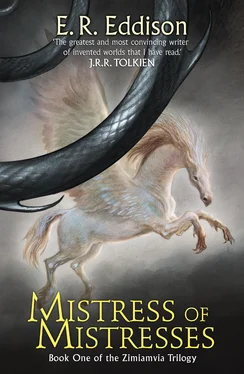
Published by HarperCollins Publishers Ltd
77-85 Fulham Palace Road
Hammersmith, London W6 8JB
www.harpercollins.co.uk
Copyright © E. R. Eddison 1935
Jacket illustration by John Howe © HarperCollins Publishers Ltd. 2014
E.R. Eddison asserts the moral right to be identified as the author of this work.
A catalogue copy of this book is available from the British Library.
This novel is entirely a work of fiction. The names, characters and incidents portrayed in it are the work of the author’s imagination. Any resemblance to actual persons, living or dead, events or localities is entirely coincidental.
All rights reserved under International and Pan-American Copyright Conventions. By payment of the required fees, you have been granted the non-exclusive, non-transferable right to access and read the text of this e-book on screen. No part of this text may be reproduced, transmitted, down-loaded, decompiled, reverse engineered, or stored in or introduced into any information storage and retrieval system, in any form or by any means, whether electronic or mechanical, now known or hereinafter invented, without the express written permission of HarperCollins.
Source ISBN: 9780007578139
Ebook Edition © October 2014 ISBN: 9780007578146
Version: 2014-09-09
WINIFRED GRACE EDDISON
To you, madonna mia,
and to my friend
EDWARD ABBE NILES
I dedicate this
Vision of Zimiamvia
Proper Names the reader will no doubt pronounce as he chooses. But perhaps, to please me, he will keep the i ’s short in Zimiamvia and accent the third syllable: accent the second syllable in Zayana , give it a broad a (as in ‘Guiana’), and pronouce the ay in the first syllable – and the ai in Laimak – as in ‘aisle’: keep the g soft in Fingiswold : let Memison echo ‘denizen’ except for the m : accent the first syllable in Rerek and make it rhyme with ‘year’: remember that Fiorinda is an Italian name, Amaury, Amalie, and Beroald French, and Antiope , Zenianthe , and a good many others, Greek: last, regard the sz in Meszria as ornamental, and not be deterred from pronouncing it as plain ‘Mezria’.
Mère des souvenirs, maîtresse des maîtresses,
O toi, tous mes plaisrs! ô toi, tous mes devoirs!
Tu te rappelleras la beauté des caresses,
La douceur du foyer et le charme des soirs,
Mère des souvenirs, maîtresse des maîtresses!
Les soirs illuminés par l’ardeur du charbon,
Et les soirs au balcon, voilés de vapeurs roses.
Que ton sein m’était doux! que ton cœur m’était bon!
Nous avons dit souvent d’impérissables choses
Les soirs illuminés par l’ardeur du charbon.
Que les soleils sont beaux dans les chaudes soirées!
Que l’espace est profond! que le cœur est puissant!
En me penchant vers toi, reine des adorées,
Je croyais respirer le parfum de ton sang.
Que les soleils sont beaux dans les chaudes soirées!
La nuit s’épaississait ainsi qu’une cloison,
Et mes yeux dans le noir devinaient tes prunelles,
Et je buvais ton souffle, ô douceur, ô poison!
Et tes pieds s’endormaient dans mes mains fraternelles.
La nuit s’épaississait ainsi qu’une cloison.
Je sais l’art d’évoquer les minutes heureuses,
Et revis mon passé blotti dans tes genoux.
Car à quoi bon chercher tes beautés langoureuses
Ailleurs qu’en ton cher corps et qu’en ton cœur si doux?
Je sais l’art d’évoquer les minutes heureuses!
Ces serments, ces parfums, ces baisers infinis,
Renaîtront-ils d’un gouffre interdit à nos sondes,
Comme montent au ciel les soleils rajeunis
Après s’être lavés au fond des mers profondes?
– O serments! ô parfums! ô baisers infinis!
BAUDELAIRE
CONTENTS
Cover
Title Page
Copyright
Dedication
Epigraph
Foreword by Douglas E. Winter
THE OVERTURE
ZIMIAMVIA
I. A Spring Night in Mornagay
II. The Duke of Zayana
III. The Tables Set in Meszria
IV. Zimiamvian Dawn
V. The Vicar of Rerek
VI. Lord Lessingham’s Embassage
VII. A Night-Piece on Ambremerine
VIII. Sferra Cavallo
IX. The Ings of Lorkan
X. The Concordat of Ilkis
XI. Gabriel Flores
XII. Noble Kinsmen in Laimak
XIII. Queen Antiope
XIV. Dorian Mode: Full Close
XV. Rialmar Vindemiatrix
XVI. The Vicar and Barganax
XVII. The Ride to Kutarmish
XVIII. Rialmar in Starlight
XIX. Lightning Out of Fingiswold
XX. Thunder Over Rerek
XXI. Enn Freki Renna
XXII. Zimiamvian Night
NOTE
DRAMATIS PERSONAE
MAPS OF THE THREE KINGDOMS
ALSO BY E. R. EDDISON
ABOUT THE PUBLISHER
FOREWORD
BY DOUGLAS E. WINTER
‘Is this the dream? or was that?’
WORDS create worlds: storytelling is a kind of godhood, taking the imperfect day of language, moulding it in the writer’s own image and, with skill, breathing it to life. The task is a formidable one, and it is little wonder that most fiction is content with reinventing reality, safely sculpting what is known. And why not? Stories are for the most part entertainment, ephemeral, meant only for the moment. Few novels strive for life beyond their covers; few hold us in their dominion for years, fewer still for lifetimes. The words and the worlds of E. R. Eddison, which I first discovered more than twenty years ago, still intrigue me, uplift me, haunt me, today. I know that I am not alone.
Eric Rücker Eddison (1882–1945) was a civil servant at the British Board of Trade, sometime Icelandic scholar, devotee of Homer and Sappho, and mountaineer. Although by all accounts a bowler-hatted and proper English gentleman, Eddison was an unmitigated dreamer who, in occasional spare hours over some thirty years, put his dreams to paper. In 1922, just before his fortieth birthday, a small collector’s edition of The Worm Ouroboros was published; larger printings soon followed in both England and America, and a legend of sorts was born. The book was a dark and blood-red jewel of wonder, equal parts spectacle and fantasia, labyrinthine in its intrigue, outlandish in its violence. It was also Eddison’s first novel.
After writing an adventure set in the Viking age, Styrbiorn the Strong (1926), and a translation of Egil’s Saga (1930), Eddison devoted the remainder of his life to the fantastique in a series of novels set, for the most part, in Zimiamvia, the fabled paradise of The Worm Ouroboros. The Zimiamvian books were, in Eddison’s words, ‘written backwards’, and thus published in reverse chronological order of events: Mistress of Mistresses (1935), A Fish Dinner in Memison (1941), and The Mezentian Gate (1958). (The final book was incomplete when Eddison died, but his notes were so thorough that his brother, Colin Eddison, and his friend George R. Hamilton were able to assemble the book for publication.) Although the books are known today as a trilogy, Eddison wrote them as an open-ended series; they may be read and enjoyed alone or in any sequence. Each is a metaphysical adventure, an intricate Chinese puzzle box whose twists and turns reveal ever-encircling vistas of delight and dread.
Читать дальше













